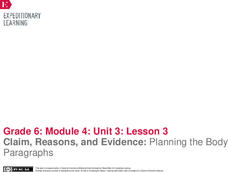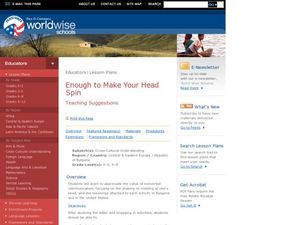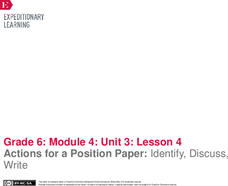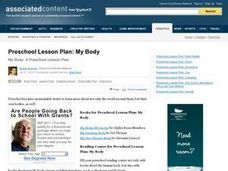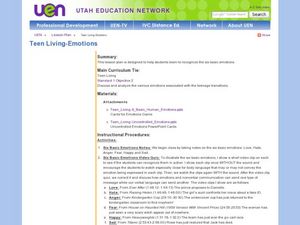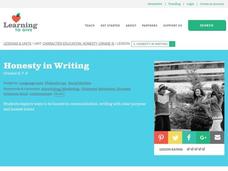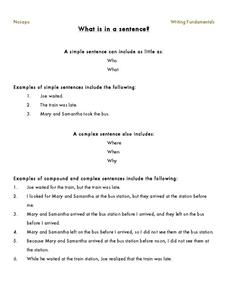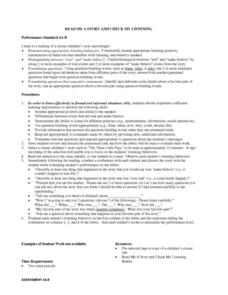Curated OER
Non-Verbal Communication
Many developmentally disabled students struggle with accurately conveying messages and interpreting those of others around them, especially when they are non-verbal. This lesson contains fun activities and exercises, such as talking with...
ProCon
Police Body Cameras
Should police officers wear body cameras? Scholars consider the question as they use the resource to conduct independent research about the debate topic. They read a brief background and peruse the main pros and cons about the issue....
EngageNY
Claim, Reasons, and Evidence: Planning the Body Paragraphs
Planning is the key to success. Scholars continue planning their essays by adding reasons to their Planning My Argument graphic organizers. Additionally, pupils analyze a body paragraph from a model position paper, identifying the...
Houghton Mifflin Harcourt
Nature Walk: English Language Development Lessons (Theme 2)
Walking in nature is the theme of a unit designed to support English language development lessons. Scholars look, write, speak, and move to explore topics such as camping, woodland animals, instruments,...
Curated OER
Enough to Make Your Head Spin
Students investigate the world of nonverbal communication by analyzing body language around the world. In this cultural communication lesson, students research the Bulgarian language and how we could easily misinterpret their...
EngageNY
Actions for a Position Paper: Identify, Discuss, Write
Anchors aweigh, it's time to write! After viewing an anchor chart detailing the parts of a position paper, pupils share their plans for their essays with a partner. Next, they write the rough draft of their body paragraphs.
Curated OER
Basic Visual Language Ii: How To Analyze a Visual Text
Students identify techniques used to communicate visually. They compare and contrast different visual techniques found in mass media. They apply their understanding by creating photographs that use a variety of visual literacy techniques.
Curated OER
Body Biography: The Lion, the Witch and the Wardrobe
Class groups assume the identity of one of the primary human characters in The Lion, the Witch and the Wardrobe. They create a body biography that identifies the most important traits of their character, translate these traits into...
Curated OER
Identifying and Generating Rhyming Words, Body
Can you tell which words rhyme? Choose a body part as a starting word (i.e. head) and begin saying words to see if learners can identify those that rhyme. Does red rhyme with head? Continue giving examples, some...
Curated OER
Identify Genre, Subgenre, and Author's Purpose
Explore genre, subgenre, and author's purpose in this helpful worksheet. Middle schoolers read several summaries of books and short stories, and identify the genre and subgenre. They also determine if the author's purpose is to...
District 186 Springfield Public Schools
Tone, Mood, Theme, and Motif
It's all well and good when you're asked to identify a speaker's tone using his or her body language, facial expression, and pitch and emphasis. Identifying the tone of a written passage is another challenge entirely. Check out an...
Curated OER
"My Body"
Learners participate in various shared reading and writing activities related to the book "My Body" by Rhonda Jenkins. They identify and list words that could be used to label other body parts in the book, draw a picture of their face...
Curated OER
X-ray Specs and Badges
In this X-ray specs learning exercise, students read an article about social X-ray glasses and sociometric badges, then complete a set of 29 comprehension questions.
Curated OER
Animals and Humans
Young scholars identify the functions of various body parts. They participate in the "Head, Shoulders, Knees, and Toes" song, draw a picture of themselves and other mammals, and create a traced outline of their body that they add...
ProCon
Obesity
Is obesity a disease or just a preventable risk factor for other diseases? Scholars attempt to form their own opinions by reading a background of the issue and watching videos that explore the main pro and con arguments using an included...
Curated OER
Teen Living: Six Basic Emotions
Helping teens recognize and identify the six basic emotions, this activity involves a game in which they match feelings with statements on cards. No game card content is attached. View film clips first with no sound to evaluate body...
Curated OER
Honesty in Writing
Help your class construct an honest and clear writing piece. They explore tactics in advertising and identify deceptive language. They then write a statement about a community issue using honest language.
Nosapo
What Is in a Sentence, Paragraph, and Story?
Language arts is made up of many parts. Learners review the parts of a sentence, as well as how to make a simple sentence into a complex sentence, before examining full paragraphs and identifying the topic, body, and concluding sentence...
Curated OER
Read Me a Story and Check My Listening
Students develop listening and reading skills with the oral reading of a story. The students demonstrate good listening skills using appropriate body language and answering assessment questions. They discuss the story looking for main...
Curated OER
Body Parts in Spanish
Students use Spanish to recognize and recall body parts. In this Spanish anatomy lesson, students identify and name the parts of the body in Spanish. Students describe a person physically by his hair and color of eyes. Students graph...
Curated OER
"Body Decorating and the Risks"
Learners read and outline a piece of expository writing to study the risks associated with tattoos and body piercing. They brainstorm low risk, healthful ways of expressing their identity as teens.
Curated OER
Identifying Island Countries
Students discover the definition of an island and identify island countries around the world. In this geography instructional activity, students determine the characteristics of an island. Finally the students will identify specific...
Curated OER
ESOL Vocabulary for Body Parts
Students review and write the vocabulary for basic body parts. They identify parts of the body along with new verbs then complete an activity sheet of labeling body parts and complete sentences using the correct vocabulary word.
K20 LEARN
Friends, Romans, Countrymen, Lend Me Your Emotions: Julius Caesar
Scholars, high schoolers, class members! With the help of this lesson, you too can identify the three persuasive appeals (ethos, pathos, and logos) the characters in William Shakespeare's tragedy Julius Caesar used to convince...




